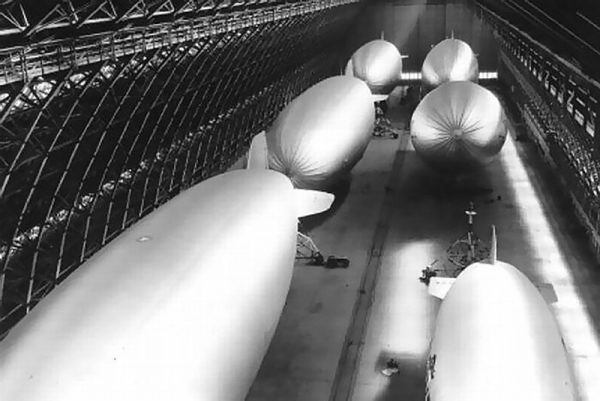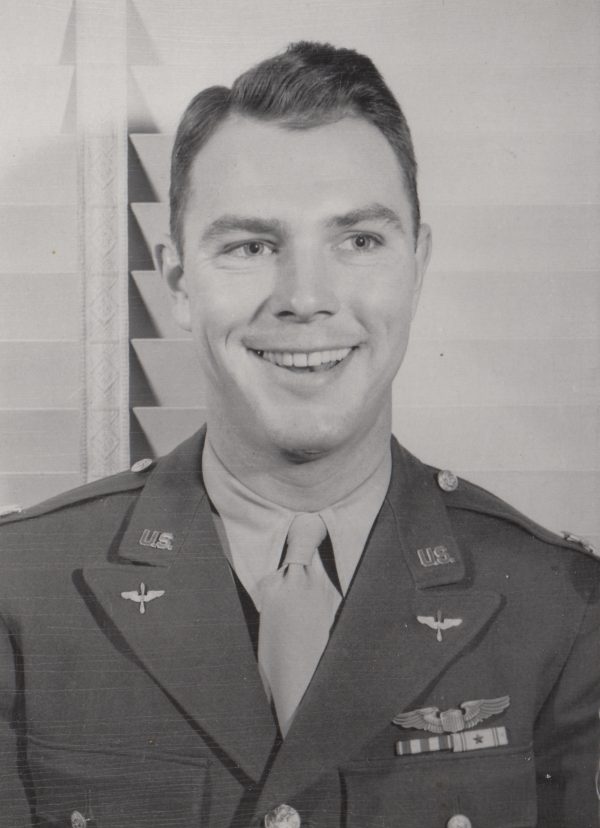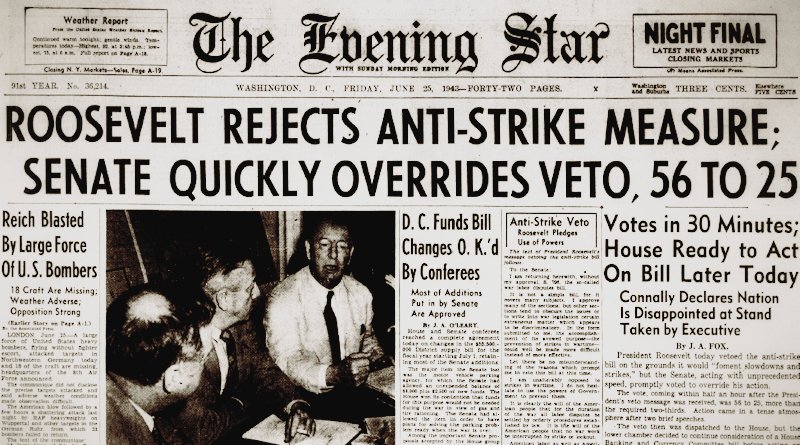World War II Chronicle: June 25, 1943
Click here for TODAY’S NEWSPAPER
Page two reports that the Navy is building several 171-foot-tall blimp hangars across the country. Strategic construction materials like steel were barred from use nearly two years ago, so these will be the world’s largest freestanding unsupported wood structures. Naval Air Stations in Lakehurst, N.J.; Moffett Field, Calif.; Weymouth, Mass.; Glynco, Ga.; Houma, La.; Hitchcock, Texas; Tillamook, Ore.; and Lighter-Than-Air Stations Richmond, Fla. and Santa Anna, Calif. Several are still standing in 2023.

Page four reports that Brig. Gen. Nathan Bedford Forrest III is reported missing after an Eighth Air Force raid on the sub yards at Kiel. His B-17 was damaged by flak and enemy aircraft before plunging into the Baltic Sea. Although other aircrews spotted eight parachutes, all but two of the crew members perish in the crash or drown before German search and rescue planes reach the scene. Forrest’s great-grandfather is the famed Confederate cavalry officer Nathan Bedford Forrest. Gen. Thomas J. “Stonewall” Jackson’s great- grandson, Maj. Thomas Jonathan Jackson Christian Jr. is also an Army Air Force officer, commanding the 361st Fighter Group. His father is an Army Air Force brigadier general. Gen. Forrest, Gen. Christian, and Maj. Christian all are West Point Graduates…

George Fielding Eliot column on page 13… Sports section begins on page 18.
Roving Reporter by Ernie Pyle
SOMEWHERE IN AFRICA — You know me when I get started traveling — I just can’t ever seem to stop. So I came back to North Africa from the Tropics by the longest possible route I could find — via Egypt.
It’s a long haul. It takes you clear across Africa, down the Nile, and back along the whole Mediterranean shore. It takes you into parts of deepest Africa that few Americans had ever seen before the war. It makes you realize more than ever how completely global, poking into the farthest and tiniest recesses, this war really is.
Nearly everywhere you go you find some American troops, from mere handsful up into thousands. They are not fighting troops, they are the builders and maintainers of airdromes, who sort of catch our multitudes of airplanes and toss them on to the next station on their long haul from America to Russia, India, China.
The men who staff these remote landing fields up and down Africa live a strange and almost inconceivable kind of existence. They are completely divorced from life as they know it back home, and from the war, and from all normal associations with people of their own kind. And yet, because of the airplane and the radio, they keep in close mental touch with the world.
At the most weirdly isolated places they get mail from home quicker than we do in North Africa. They set themselves up in permanent quarters more homelike than ours in the north. They are in no danger, but they must bear the great crosses of heat, isolation and monotony. On the whole they don’t seem to mind it much.
At one certain field our men have built a big permanent camp. Overnight transients are assigned to wooden cots in open barracks. Each block has toilets and showers, and it’s wonderful to get under that water after a hard day of flying. At the back of each block is a big electric refrigerator, and it is filled with scores of Coca-Cola bottles, containing not Coca-Cola but cold water. You drink continuously in these hot places.
There is only one white woman — a British nurse — within 200 miles. All gasoline has to be trucked 375 miles from the end of the nearest railroad. And yet things aren’t so bad. Listen —
Beautiful Arabian horses abound there. Before the Americans came, you could buy one for $20. Now the price has gone up to $50, but even so you’ve got a horse that would cost you $500 to $1000 back home. There are 175 Americans in this camp, and 50 of them own their own horses.
Down there when you buy a horse you don’t just buy a horse. You also buy (all included in the $50) the bridle, the blanket, the saddle, the horseboy, and the horseboy’s whole family!
Our men have built a big three-sided barn. On one side are the horses’ stalls. At the end the feed and saddles are kept. Along the other side the horseboys and their families live.
A horseboy does nothing whatever except feed and care for your horse. It’s his craft. You wouldn’t think of asking him to do anything else. He sticks with that horse as long as the horse lives, and if he doesn’t like the new owner, professional ethics make him stick with you regardless.
And are youwondering about the upkeep of an Arabian horse and horseboy and horseboy’s family? Well, I raised that question and discovered that the total cost of feeding for the horse, pay for the boy and food for his whole family is — 10 cents a day. Horsemen, here’s your paradise.
The commanding officer at this place is Lieut. George Hester, of Tubac, Ariz. He spent five years with American Airlines in the States and with Pan American Airways in Central America before coming over here. He likes his work and finds the life interesting and full.
For instance, he was telling me about a recent huge conclave of chiefs, a sort of annual review climaxed by a parade of 500 horsemen. As Commandant, Lieut. Hester was asked to sit with the big chief and review the parade.
He says it was one of the most moving sights he had ever seen.
The horses were flamboyantly decked out, some of them in red velvet pants, and a thousand of the 5000 horsemen wore coats of mail that had been handed down right from the day of the Crusaders.
These Negroes are mostly Mohammadans. They seem to have a tinge of Arabian in them, and they speak a language that is incomprehensible to the coastal Negroes.
These people dead in the heart of Africa know little about what goes on in the world. The average native knows vaguely that there is a war on, but he can’t conceive of it’s proportions because he actually doesn’t know how big the world is. His conception of the Allies is merely that England is big and America generous. He knows little about the oceans. He knows roughly that America is somewhere west and Cairo somewhere east, near Mecca. He has never heard of Japan.
I think maybe he’s got something there.
Evening star. (Washington, D.C.), 25 June 1943. Chronicling America: Historic American Newspapers. Lib. of Congress.
https://chroniclingamerica.loc.gov/lccn/sn83045462/1943-06-25/ed-1/
